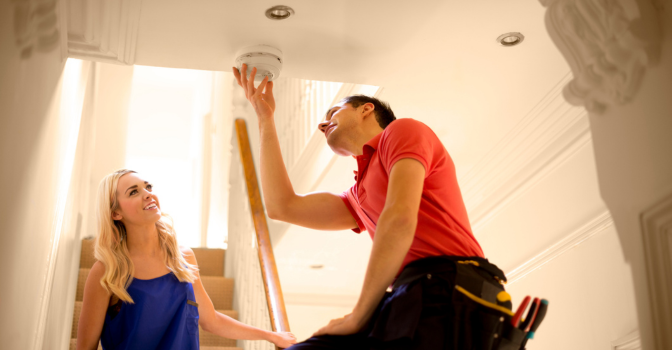Smoke alarms save lives. Having the right smoke and fire warning system in your home is an essential safety measure for you and your family.
For anyone who is deaf or hard of hearing, standard smoke detection systems may not be adequate for providing timely alerts when a fire in the home.
Today we’re exploring what the NDIS may fund in relation to smoke alarms for people who are deaf or hard of hearing and other schemes that may provide support.
What do smoke alarms do?
Smoke alarms are devices that detect smoke and alert people in case of fire, typically with a repetitive, loud, high-pitched sound.
All Australian states have regulations around the types and number of smoke alarms that must be installed in residential buildings including rental properties, public housing and private homes.
While there are different laws in every state and territory, most now require photoelectric smoke detectors which use a light beam to detect visible smoke.
Most states require residences to have mains powered (rather than battery operated) alarms that are interconnected which means they all sound if there’s a fire although some states are still phasing in this requirement. Check with the authorities in your state.
Options for people who are deaf or hard of hearing.
A working smoke alarm is your first line of defence in the event of a fire according to the Victorian Fire Service. A small fire can grow to involve an entire room in just two to three minutes.
For people who are deaf or hard of hearing, advanced smoke alarm and detector systems that use flashing lights or vibrations may be required to provide potentially life-saving alerts in the case of a fire.
These systems usually consist of two components:
- A high intensity strobe light which flashes when the alarm sounds, offering a visual alert during the day.
- A vibrating shaker pad that can be placed under your pillow to offer a tactile alert if you’re sleeping.
Advanced smoke alarm and detector systems can be connected wirelessly to existing alarms.
Smoke alarms and the NDIS.
The NDIS may fund smoke alarms and alerting systems for people who are deaf or hard of hearing, if the purchase meets the reasonable and necessary and assistive technology requirements. This is the case for both adults and children.
The NDIS will consider:
- If the support is disability-related
- Whether it’s connected to your goals, such as to become more independent
- If it’s good value for money
- Whether it’s effective and beneficial, having regard to good practice and evidence
- Your functional capacity to respond to an alarm (intellectually, emotionally and physically)
- Any smoke alarms you already use or own
- Any systems in place for other residents in the home with similar needs
- If it’s the responsibility of another organisation or body to fund the alarm such as a state housing authority.
The NDIS is more likely to fund a specialised smoke alarm alert system for people who cannot hear a standard audible alarm. If you have mild hearing loss but can hear a standard smoke alarm without a hearing aid, the NDIS is unlikely to fund additional smoke detector equipment.
What the NDIS may cover.
The NDIS will only fund the equipment required because of a disability. The NDIS won’t usually fund the cost of a standard smoke detector or upgrading to new systems required under state laws – those costs should be covered by the homeowner.
The NDIS may fund:
- Visual strobe light
- Bed shaker tactile alarm
- Installation and training in how to use the system
- Modifications to a current system if considered more cost effective.
The process for getting NDIS funding for a smoke alarm.
- It’s best to obtain advice from a relevant health professional such as an audiologist first about what smoke alarm would be suitable.
- Chat with your planner about low-cost assistive technology. Written evidence is not required if the item costs less than $1,500 but it’s good practice to obtain a couple of quotes first.
- Funding is added to low-cost assistive technology in the Core budget of your NDIS plan.
You can also flexibly purchase specialised smoke detectors or alarms if:
- The purchase meets NDIS requirements
- You have enough funding in your existing Core budget
- The item costs less than $1,500.
State subsidy programs.
Currently the only states offering a subsidy program for people who are deaf or hard of hearing to upgrade their smoke alarms are Queensland and Victoria.
The Deaf Connect Smoke Alarm Subsidy Scheme helps Queenslanders who are deaf or hard of hearing to purchase specialty smoke alarms. The out of pocket cost is only $50 for non-concession card holders or $20 for concession card holders (the full cost is over $700).
The Victorian Smoke Alarm Subsidy is only eligible to residents of Victoria who are not eligible for other funding schemes such as the NDIS. To be eligible you must be Deaf or hard of hearing with a severe to profound loss or a severe high frequency hearing loss.
Maintaining your smoke alarm.
It is essential to ensure smoke alarms are tested regularly to ensure they are functioning properly. If you need additional assistance with installation and testing because of your disability, the NDIS may be able to assist.
If you still have old-style smoke alarms in your home, don’t forget to regularly replace batteries and replace smoke alarms that are more than ten years old.
We can help.
If you need some help to understand how smoke alarms and alert systems work under the NDIS or any other NDIS query, the Leap in! Crew is here to help.
If you would like to find out more, check out the app, call the Leap in! Crew on 1300 05 78 78, or sign up to Leap in! plan management today.

